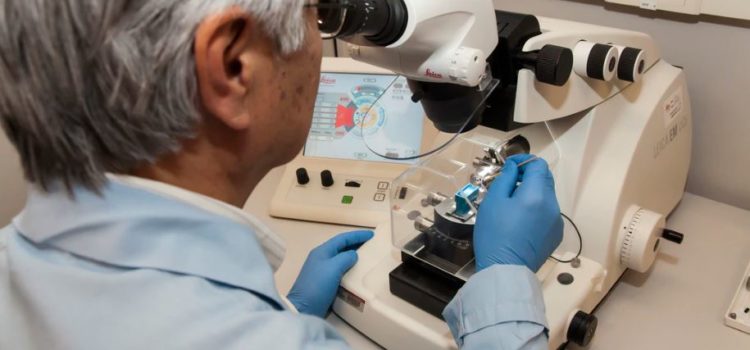

This article is an excerpt from the Shortform summary of "The Immortal Life of Henrietta Lacks" by Rebecca Skloot. Shortform has the world's best summaries of books you should be reading.
Like this article? Sign up for a free trial here .
Who was the geneticist that may have revealed Henrietta’s real name? How did Victor McKusick attempt to dupe the Lacks family? Did McKusick and his postdoctoral fellow Susan Hsu do anything wrong?
Victor McKusick is the geneticist at Johns Hopkins that studied the genes of Henrietta Lacks’ family. He and Susan Hsu were working on the issue of HeLa contamination.
Find out what Victor McKusick and Susan Hsu did, and whether it was legal.
A Hopkins geneticist named Victor McKusick, who’d been one of the authors to first publish Henrietta’s real name, had volunteered to take the lead on addressing the contamination issue that was then upending cell science. His idea was that, if he could draw blood from Henrietta’s descendants, he could isolate certain gene markers that would allow him to determine which cells were HeLa and which weren’t. And since the Lackses were Hopkins patients, he had easy access to their medical records and contact information.
The Ruse to Collect Blood Samples
McKusick deputized a postdoctoral fellow named Susan Hsu to collect the blood samples from the Lackses. Hsu was Chinese and had recently immigrated to the United States; English was not her native language, and she spoke with a heavy accent. She called Day and explained that she needed to draw blood from him and his family to locate “HLA markers,” or particular proteins that could be used as genetic identifiers. Day, who’d only had four years of school in his life and spoke with a heavy southern accent that challenged even his own family, did not understand what Hsu was asking for; he thought Hsu wanted to test him and the Lacks children for cancer.
Informed Consent Requirements
Neither Hsu nor McKusick got informed consent from the Lackses, either. At the time, NIH had mandated that all research it funded involving human subjects required informed consent—Victor McKusick’s research was NIH funded—but the informed-consent requirement had yet to be made law. In fact, only months after Hsu first called Day, a proposed federal law mandating informed consent would be made available for public comment.
Deborah’s Blood Test
A few days after Hsu’s call to Day, the family gathered at Lawrence’s, and Hsu and another colleague drew the Lackses’ blood. Deborah, who was 24 at the time, was petrified: She knew that her mother had gotten cancer at thirty and worried that she would get terminally ill at the same age, leaving her two children motherless.
In the days following Hsu’s visit, Deborah called Hopkins repeatedly to ask about her “cancer results.” The operators could find no record of any test. Deborah’s fears worsened, and she began to worry that, rather than trying to help the Lackses, the Hopkins doctors were causing them harm. She’d read about the Tuskegee syphilis study and Chester Southam (see Part 2: Chapter 6), and she wondered if Hsu had actually infected the family with her mother’s blood to see if they developed cancer.
Her suspicions were helped along by the family’s incomplete picture of Henrietta’s illness. When Deborah asked Day about the timeline and details of her mother’s death, Day told her, essentially, that Henrietta had been perfectly fine up until she started going to Hopkins. It was only after she started receiving treatment that her skin burned and she wasted away.
Deborah Lacks Meets Victor McKusick
In June of 1974, Deborah met McKusick for the first and only time. She had been called into Hopkins to give more blood, and she took the opportunity to ask McKusick questions about her mother and why the doctors were drawing blood from the family. Rather than answer her directly, McKusick spoke about the contribution Henrietta’s cells had made to science; he also gave Deborah a copy of a genetics textbook he’d written that featured a section on Henrietta. The language was far too technical for Deborah to understand, but she fixated on the picture of her mother printed in the book; it was one she’d never seen. She wondered how the doctors had gotten a hold of the picture.
Breach of Privacy?
At the same time that Henrietta was becoming a known figure, Victor McKusick and Susan Hsu were publishing the results of their research into the Lacks’ genes. Incredibly, the authors presented the Lackses’ genetic information with labels like “Husband” and “Child 1” alongside Henrietta’s real name, which would allow anyone to know whose genetic information was whose. A breach of privacy like this would, in the present, be a crime under the 1996 Health Insurance Portability and Accountability Act (HIPAA) that could trigger fines of up to $250,000 or jail time.
The Lackses were totally oblivious to Victor McKusick and Susan Hsu’s publication. They didn’t even know that Hsu had drawn blood for a gene study; they thought the doctors were still researching cancer.

———End of Preview———
Like what you just read? Read the rest of the world's best summary of Rebecca Skloot's "The Immortal Life of Henrietta Lacks" at Shortform .
Here's what you'll find in our full The Immortal Life of Henrietta Lacks summary :
- How Henrietta's cells became used in thousands of labs worldwide
- The complications of Henrietta's lack of consent
- How the Lacks family is coping with the impact of Henrietta's legacy






